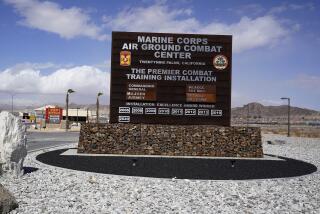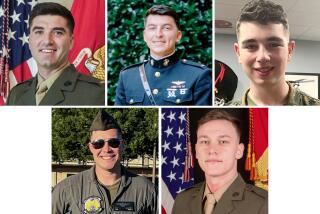Marines in Afghanistan prepared for a long haul
- Share via
Reporting from Forward Operating Base Dwyer, — If Marine Lance Cpl. Kevin Oratowski was intimidated about briefing three visiting generals as he headed out on another overnight patrol chasing the Taliban, he didn’t show it.
“We’re ready to go,” the 23-year-old from Camp Pendleton said brightly, his enthusiasm seemingly undimmed by the fact that he had spent most of the last 60 days in the heat, danger and uncertainty of Helmand province.
A few hours later, he was dead from a Taliban roadside bomb.
As the three generals watched the next day, Oratowski’s casket was loaded aboard a C-130 to begin its journey home. The cargo plane lumbered down a runway that didn’t exist just a few months ago and lifted heavily into the southern Afghanistan sky.
Next to the runway, earthmovers pushed mountains of gravel for other construction projects at the base here, projects to expand the “footprint” of the Marines as they settle in for a long battle for Helmand.
A year since the U.S. troop buildup in Afghanistan began with battalions of Marines descending on the Helmand River Valley, optimism about a quick defeat of the insurgents after early small-scale routs has given way to more sober assessments.
As the death toll steadily climbs, the top Marine warns that it could take as long as five years to defeat the Taliban and help the Afghan government establish a credible presence.
The massive assault in February on the Taliban-run town of Marja has not lived up to the U.S. prediction that it would prove a “tipping point” for the province. Two battalions of Marines are still assigned to protect Marja, but Taliban fighters spread messages of terror at night and plant bombs, killing Marines and villagers.
The provincial and national governments provide only a trickle of services. The vaunted “government-in-a-box,” a promise to establish a government in Marja as soon as the fighting stopped, was largely a flop.
“I think Stan McChrystal over-promised in regards to government-in-a-box,” Marine Commandant Gen. James Conway said, referring to the Army general who was then the top U.S. commander in Afghanistan.
Even as President Obama talks of beginning a U.S. withdrawal from Afghanistan next July, in Helmand, the talk is of “trend lines” and “metrics” rather than a quick knockdown.
In a series of meetings with Marines of all ranks, Conway said he expected Marines — whose numbers have doubled, to 20,000, in Helmand in the last 14 months — to be here until 2014 or 2015. Be prepared for a second or third tour, he said.
“We’re still going to have to convince these people who are fighting us that we are the strongest tribe,” Conway told several hundred Marines just minutes after the C-130 with Oratowski’s casket departed.
Conway and other senior officers say they remain confident of ultimate victory. It is a confidence born of the Marines’ experience in Iraq’s Anbar province, which in 2006 was branded as a lost cause by a Marine intelligence report but within two years was considered an example of the U.S. ability to defeat a ruthless insurgency.
“I’m an inveterate optimist,” Conway said in an interview at the end of his Helmand trip. “I found things better than I would have expected based on [media reports] and on intelligence I’ve been reading.”
The Western military has lately been touting the success of pinpoint special-operations raids targeting midlevel Taliban field commanders, particularly in the south.
NATO’s International Security Assistance Force said this week that coalition and Afghan troops had conducted thousands of raids that it said had fostered “a growing sense of distrust” among the Taliban, heightening the fear of spies in their midst.
The Taliban, of course, paints a much different picture. In a statement this week, spokesman Qari Yousef Ahmadi boasted of expanding influence in Kandahar and Helmand provinces, the insurgency’s spiritual home.
“Helmand is … a great example of the defeat of the enemy,” Ahmadi said in a statement posted on the movement’s website. “An example of this is the Marja operation, in which thousands of [Western] and Afghan soldiers took part. They made it sound as if World War III had started, but now they are ashamed to even mention the name of Marja, due to their disgraceful defeat.”
“Patience, patience” are the Marines’ watchwords.
Conway repeatedly told the young troops at large bases and small operating posts that Helmand is about where Anbar was in 2005 in terms of turning back an insurgency. Most of the Marines are veterans of Anbar, where they learned the value of persistence.
“You can either lose fast or win slow in Afghanistan,” said Col. Randy Newman, commander of the Regional Combat Team Seven assigned to the province’s central region. “This country can’t sustain ‘fast.’ It’s all about relationships, and that takes time.”
The tempo of combat is increasing throughout Helmand, as well as an adjacent area to the west near the Iranian border where Marines have joined other special operations troops to disrupt desert routes used by the Taliban to ferry fighters into Helmand and resupply them.
Troops report brief but furious firefights with Taliban insurgents near the border with Pakistan and other areas, particularly near the Kajaki dam, now guarded by a Marine artillery battery.
There have been successes and disappointments.
Villagers have been returning to the onetime ghost town of Now Zad since Marines routed the Taliban in December. The village of Nawa, once controlled by the insurgents, now has schools, a health clinic, a flourishing marketplace and a weekly livestock auction.
But key patches of the region remain under control of the Taliban; fighters set up illegal checkpoints and rob villagers desperate to take their goods to market. The response from the governments in Lashkar Gah and Kabul, the nation’s capital, has been sluggish at best.
Haqyar, a 34-year-old shopkeeper in Marja who goes by one name, said the security situation had improved slightly in the last two months but townspeople remained edgy.
“The Taliban carry out hit-and-run attacks that last only a few minutes, but they can intimidate people whenever they want,” he said.
Tribal leaders are also concerned.
“President Obama has said you are leaving,” Mohammad Haji Helmandi told Conway at a meeting in Nawa, the village where the U.S. has had the most success. “This is not good. It gives the Taliban a chance.”
The training of Afghan soldiers and police officers under a NATO project has been slow. In frustration, the Marines opened their own training facility at their main base at Camp Leatherneck; it’s run by a retired Marine gunner who managed a similar program in Iraq.
Occasionally there are clashes of temperament and strategic differences between the Americans and their coalition partners. In a recent incident near Sangin, a British commander declined to order an artillery attack on location of a suspected Taliban sniper for fear of possible civilian casualties. Marines were furious.
To wrest control of the province from the Taliban, Marines have fanned out to be near the populace. A base that didn’t exist two weeks ago is now functioning as the headquarters of a 1,200-member battalion.
“We’re going to be here a while,” said Lt. Gen. Thomas Waldhauser, who is awaiting Senate confirmation as commander of the 1st Marine Expeditionary Force. “We’re going to do this thing right.”
As Marines have pushed into uncontested areas in the province, casualties have mounted.
The majority of U.S. deaths are caused by roadside bombs that strike vehicles or foot patrols. Within days of Oratowski’s death, seven more Marines died in combat.
Marines have grown accustomed to the ritual of “ramp ceremonies.” After Oratowski’s casket was lifted gingerly into the C-130, Marines were invited by the chaplain to pay their final respects as the lance corporal from the 1st Light Armored Reconnaissance Battalion began the trip to Wheaton, Ill.
Some knelt beside the casket, making the sign of the cross. Some leaned their heads lightly on the American flag that was pulled tightly around the metal coffin. As they left, some had tears in their eyes, others a faraway look.
Navy Cmdr. Andrew Wade, the battalion chaplain, offered a somber farewell: “Lord, we ask you to watch over our brother on his way home.”
tony.perry@latimes.com
Times staff writer Laura King in Kabul contributed to this report.
More to Read
Sign up for Essential California
The most important California stories and recommendations in your inbox every morning.
You may occasionally receive promotional content from the Los Angeles Times.










